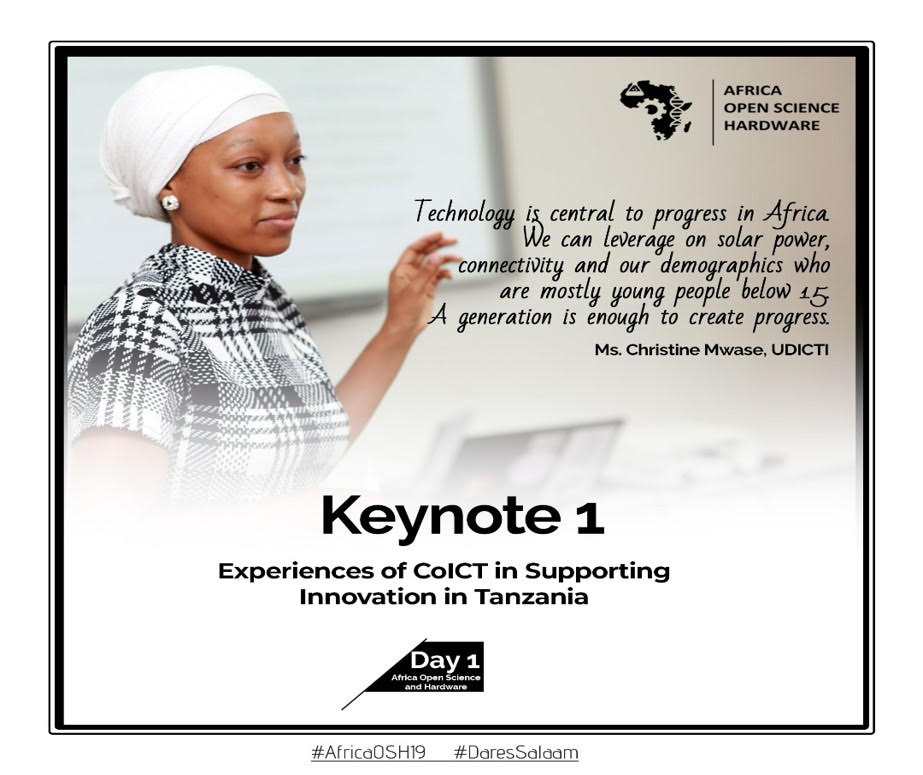Note: This is a guest blog post from Angela Muraya, who was supported by the ongoing Open Bioinformatics Foundation travel fellowship program to attend the Africa Open Science Hardware Summit 2019. The OBF’s Travel Fellowship program continues to help open source bioinformatics software developers with funding to attend conferences or workshops. If you are hoping to attend an open source / open science bioinformatics event and travel costs are a barrier, we encourage you to apply for one of our $1000 travel fellowships . The next deadline is August 15, 2019.
The Africa Open Science Hardware Summit 2019 brought citizens from about 10 African countries and overall, 15 nationalities worldwide. We gathered for the much awaited AfricaOSH version 2.0 in Dar es Salaam, Tanzania. AfricaOSH connected makers, educators, researchers and innovators from Africa and around the world to dialogue and collaborate on how to use open science and hardware to change the world. It brought together various stakeholders to explore and try to understand the place of open science principles in the African context with particular attention to Open Hardware. Various stakeholders included innovators of Open Innovations such as SangaBoard, OpenFlexture Microscope, Biomaker Training Kit, Hack-A-Toy; representatives of Open Labs such as SticLab, Just-One-Giant-Lab and Kumasi Hive, and, Open Knowledge platforms such as OpenAIR, AfricArxiv.
This auspicious summit was carried out in the beautiful city of Dar es Salaam in Tanzania at three venues. The first was the D-Lab within the University of Dar es Salaam (UDSM) courtesy of Dr. Christine Mwase, an assistant lecturer in telecommunications and a co-founder of UDICTI, the first ICT incubator in the university. The second host was BuniHub. The third host was SticLab.

Day 1
The team started the summit by touring Buni Innovation hub, open space at the Commission of Science and Technology (COSTECH) for Tanzania’s tech community to foster innovation, entrepreneurship and the culture of co-creation. Their aim is to bridge the skill gap among the youth and to make them competent enough to create innovations for self-sustenance and for solving community problems. We attended a presentation from Dr Christine on ‘Experiences of CoICT in supporting Innovation in Tanzania’. She highlighted that direction towards use of technology is exponentially expanding in Africa especially among the youth. She explained various ways in which UDICTI are empowering the youth to use technology to drive socio-economic development, especially in the informal sector, given the fact that there is a high rate of unemployment in the country.
Later, we visited SticLab – the House of Innovation, an open maker space co-founded by AfricaOSHers: Paul Nyakyi and Eng. Valerian Sanga. We saw the various on-going projects such as green farming using hydroponics, green fish farming, the MAJIPesa – water vending pump and the e-waste 3D printers and the SangaBoard they designed. They support open science by making the prototype, blueprints and codes available for the public to use and modify. As a result of embracing openness, several collaborations from other innovators enabled then redesign and modify SangaBoard v1.0 to the more improved version 2.0. I led a breakout session on Open Access Journals. During that discussion, we highlighted the various principles of Open Science which are accessibility, sharing, inclusiveness, collaboration, quality and integrity. We agreed that open is not necessarily free but can also mean that open innovations are more affordable than the traditional models thus making them easier to access, and in addition, the prototypes are available for modification. This was the motivation behind the innovation of the OpenFlexure Microscope. We covered various topic such as types of open access – green and gold, open access versus predatory journals, methods of identifying genuine open access journals, among other issues.

Day 2
The day started with a powerful presentation from Prof. Jeremy de Beer, a lecturer at Ottawa University and a co-founder of OpenAIR. Prof Jeremy’s talk was about ‘Open Innovation and Intellectual Property Rights – Solving the Paradox’ He pointed out the dilemma open innovators face when they want to legally protect their innovations through intellectual property rights and commercialize them while also keeping them open access. He proposed a third option of allowing a certain degree of porosity between the openness of ideas and knowledge which is seen in the reemerging African indigenous knowledge systems that involve passing down of knowledge from one generation to the next.
Day 3
Dr EliAmani, an associate professor at the Nelson Mandela African Institution of Science and Technology expounded on the types of property rights legally recognized: Patents, Trademarks, Copyrights, Trade secrets. He mentioned the use of open licensing as one of the policies used to protect open innovations. He leads the discussion on the fears that arise from the use of open innovations where the following were a few mentioned: challenges of sustainability of open innovations, the uncertainty of trust/goodwill, compounding effects of community ownership of innovations whereby consistent contribution to support and maintain the innovations is not guaranteed. It was established that in the African context, the greatest challenge with open innovations is that they are only used and embraced up to some time and then they are abandoned. In rare occasions, open innovations are improved and eventually commercialized.

Inclusivity was discussed focusing mainly on the role of women in open science during a breakout session and also a panel discussion in which I participated. We discussed how we can, as the scientific community, increase the interest of girls to STEM subjects. One solution was to increase mentorship to them through achieved female scientists o cab be their role models. In terms of open science, we discussed that as open science philosophy, principles and policies are being gradually developed, they should not inherit the exclusive tendencies that affect the scientific world.

Overall, I had a beautiful experience visiting my neighbor country, Tanzania, for the first time. I can hardly wait for next year’s in Cameroon! I wish to thank the Open Bioinformatics Foundation for supporting me with a Travel fellowship.